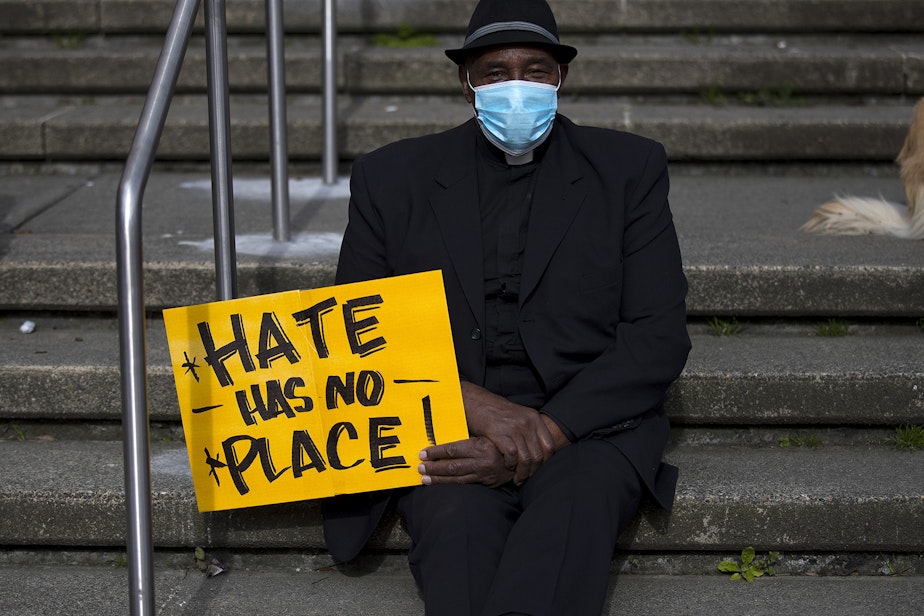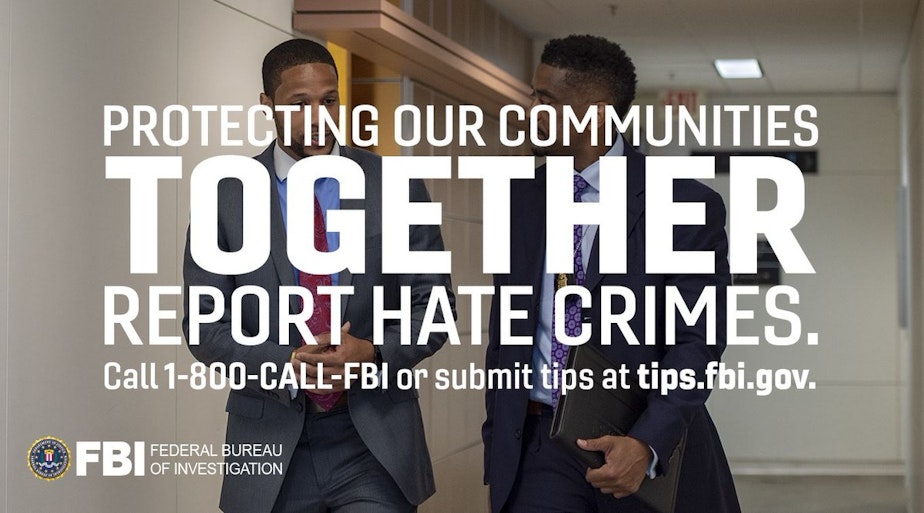FBI plans hate crime security trainings for faith communities
Over recent months, there has been a trend of vandalism and attacks targeting religious communities throughout western Washington, including broken windows at several Catholic churches, fires set at the Islamic Center of Tacoma, and an explosive device set off at a mosque in Olympia.
In early March, someone deliberately rammed a car into a prayer room at an Islamic community center in Burien.
These are unsettling times for religious communities in western Washington.
Now the FBI's Seattle Field Office is offering expanded security trainings. Supervisory Special Agent Ryan Bruett is the FBI's statewide program coordinator for Hate Crimes and Civil Rights in Washington. He spoke to KUOW’s Kim Malcolm about the effort.
This interview has been edited for clarity.

Agent Ryan Bruett: As you said, some recent events here in the greater Puget Sound area have occurred. And then also, the incident that was very well-publicized in Texas, at the Congregation Beth Israel, where the rabbi credited the training he received from the FBI and local law enforcement in helping resolve that incident. That really drove a lot of local houses of worship here, both in the Jewish community and other faiths, to reach out to the FBI and their local law enforcement to request similar trainings.
Kim Malcolm: What specifically are people going to be hearing about in these trainings?
In the four sessions in this series, we'll cover what is a hate crime and what is hate speech? We'll have a session on counterterrorism, which includes domestic terrorism and international terrorism. We'll also have a session on what to do to keep yourself and others safe if, heaven forbid, you're in a facility and someone is shooting. And we'll talk about facility protection. What are things that organizations can do to harden their targets, protect their facilities, and train their personnel better?
Sponsored
Is there more to talk about than just putting up more lighting outside?
Absolutely. Our first session will be hosted by CISA. That's the Cybersecurity and Infrastructure Security Agency within the Department of Homeland Security. They do a fantastic job. They have local protective security advisors in our region who can go out to facilities, do site surveys, and offer ways to enhance security, and train ushers to keep people safe and identify red flags.
What kinds of red flags would people be looking for?
There's a long list. It includes things from the way people are dressed. If they're wearing big, bulky overcoats in the summer maybe they're covering up weapons or explosives. CISA does a great job. People that work in these facilities and houses of worship know what to expect and what people usually look like. They're in the best position to recognize those deviations from the norm. There are all sorts of things to look for, in terms of how people are behaving.
We've seen a nationwide increase in reported hate crimes over the last five years. How would you interpret that increase in reported numbers?
We’re mindful of the statistics and the tracking and concerned by the increasing numbers that you cited. The flip side is that we recognize that hate crimes are one of the crimes that are traditionally underreported. We're concerned that crimes are occurring where people have been victimized or witnessed incidents of hate crime and for various reasons have not reported it to law enforcement.
One of the reasons why we do outreach events like this is to teach people about how important this is to us as law enforcement and to encourage reporting. We'd like to think that some of these proactive efforts have encouraged some people who might otherwise not have reported to report. In that sense, more reports are a good thing.
What would you say to religious and minority communities about how to adjust to these times and how to protect themselves?
When you see something that's concerning, report it. Report it to the FBI. Report it to your local law enforcement. These incidents that are occurring may not be considered hate crimes in the eyes of the law. We don't expect the community to understand what may or may not be a hate crime. When in doubt, report it and allow law enforcement to do our jobs of assessing that and responding.
Listen to the interview by clicking the play button above.






